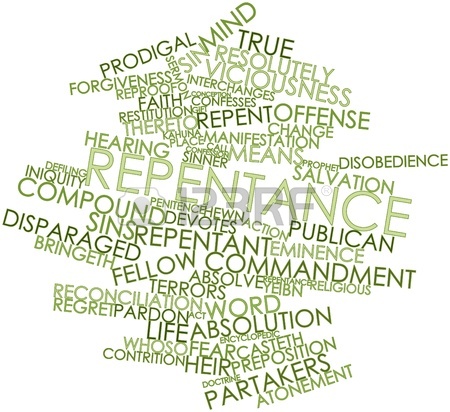Repentance
What exactly is repentance, and why does it hold such a crucial place in our spiritual journey? To elucidate this concept, let us begin with a straightforward narrative.
Consider the case of Little Johnny, a child renowned for his popularity at school, a fact that filled his parents with immense pride. Unbeknownst to them, Johnny's popularity was not a mere consequence of his personality but was largely due to his habit of distributing candy to those he deemed essential to befriend. One evening, an incident unfolded that brought a hidden truth to light. Johnny's father, needing a five-dollar bill for an early morning payment to the milkman, discovered that the bill he had earmarked for an important work meeting was missing from his wallet. Suspecting Johnny, who had recently received ten dollars as pocket money, he confronted him. To his dismay, he found the missing bill in Johnny's possession.
This incident led to a heartfelt confession from Johnny, who promised never to steal again. His parents, extending grace and mercy, forgave him. However, the pattern of theft recurred, undermining the trust in their relationship. This repetitive cycle of wrongdoing, followed by superficial repentance, is emblematic of a deeper spiritual malaise.
 This narrative, though fictional, mirrors our own spiritual struggles. It is not about Johnny, but about each one of us. It may not be theft, but it is sin in its various forms. The consequence of unrepentant sin is dire, potentially leading to spiritual estrangement from our heavenly home. True repentance involves not just seeking forgiveness but also a complete and total renunciation of sin, a 180-degree turn from our past actions. It is akin to quitting smoking; to truly quit means never to return to it. If we lapse back into sin, it indicates that our initial repentance was insincere, necessitating a more profound spiritual reckoning.
This narrative, though fictional, mirrors our own spiritual struggles. It is not about Johnny, but about each one of us. It may not be theft, but it is sin in its various forms. The consequence of unrepentant sin is dire, potentially leading to spiritual estrangement from our heavenly home. True repentance involves not just seeking forgiveness but also a complete and total renunciation of sin, a 180-degree turn from our past actions. It is akin to quitting smoking; to truly quit means never to return to it. If we lapse back into sin, it indicates that our initial repentance was insincere, necessitating a more profound spiritual reckoning.
Theological Perspectives on Repentance
Dr. J. Rodman Williams, in his work "Renewal Theology," discusses the immutable nature of God. Unlike the universe, which is in a constant state of flux, God remains unchanging. This constancy is not indicative of rigidity but rather a testament to His reliability and steadfastness in His dealings with humanity. God's "repentance" is not a change in His nature but a consistent response to human actions, reflecting different aspects of His unchanging character.
Jacobus Arminius emphasizes the covenantal nature of salvation, where obedience to God's commands is paramount. He identifies repentance, faith in Christ, and adherence to God's commands as the three pillars of this obedience, essential for the realization of God's promises.
John Calvin, in his exposition on 2 Corinthians 7:11, delineates the multifaceted nature of repentance, which includes earnestness, excuse, indignation, fear, longing, zeal, and a readiness to rectify wrongs. These elements, arising from godly sorrow, propel us towards a vigilant and spiritually disciplined life.
Dr. J. Rodman Williams writes on repentance
God is One who does not change. The universe is constantly undergoing a transition from one stage to another and human existence is marked by continuing alteration. With God there is no such mutability. "For I the LORD do not change" (Malachi 3:6). Thus does God transcend everything in His creation.
God is the Rock. He does not fluctuate from one event to the next. There is constancy and stability in all that He is and does. Hence, he is not evolving from one stage to another. There is no movement from some "primordial" nature to a "consequent" nature in any aspect of His being. God is not a becoming God, a growing God. God does not change. He is "the Father of lights with whom there is no variation or shadow due to change [literally "with whom…change has no place"] (James 1:17). Likewise, the New Testament declares that "Jesus Christ is the same yesterday and today and for ever" (Hebrews 13:8). God, whether Father or Son or Spirit, is One who changes not.
In God there is dependability and constancy in His being, acts, and purposes. The Old Testament sometimes speaks of God as "repenting" or changing His mind (e.g., Exodus 32:14). From the overall picture, the outward "repentance" does not signify a change in God's activity, but only His dependable response to man's behavior. God invariably acts the same: when man is obedient, God blesses; when man disobeys, God punishes; when man confesses his sin, God forgives. He "repents"; that is, He turns in the other direction.
Hence, God's repentance is not really a change in God, but it is His bringing to bear on the human situation some other aspect of His being and nature. God remains the same throughout.
It is important not to view God changelessness as that of hard, impersonal immobility. God is not like a statue, fixed and cold, but, quite the contrary, He relates to people. He is not the "unmoved Mover" but constantly moves upon and among men and nations. The flux and flow of life are not far away and far beneath Him. Indeed, He freely involved Himself in the life of a fickle and inconstant people to work out His purpose, and in the Incarnation he plunged totally into the maelstrom of human events. God in His own changelessness has experienced all the vicissitudes of human existence. This is the God-far from immobile and distant-who does not change.
Dr. J. Rodman Williams Renewal Theology, 1: pages 58-59.
Arminius writes
As, in the matter of salvation, it has pleased God to treat with man by the method of a covenant, that is, by a stipulation, or a demand and a promise, and as even vocation has regard to a participation in the covenant; it is instituted on both sides and separately, that man may perform the requisition or command of God, by which he may obtain [the fulfillment of] his promise. But this is the mutual relation between these two — the promise is tantamount to an argument, which God employs, that he may obtain from man that which he demands; and the compliance with the demand, on the other hand, is the condition, without which man cannot obtain what has been promised by God, and through [the performance of] which he most assuredly obtains the promise.
But divines generally place three parts in this obedience. The first is repentance, for it is the calling of sinners to righteousness. The second is faith in Christ, and in God through Christ; for vocation is made through the gospel, which is the word of faith. The third is the observance of God’s commands, in which consists holiness of life, to which believers are called, and without which no man shall see God.
Jacobus Arminius
John Calvin writes;
REPENTANCE ACCORDING TO 2 CORINTHIANS 7:11 a. It is for a very good reason that the apostle enumerates seven causes, effects, or parts in his description of repentance. They are earnestness or carefulness, excuse, indignation, fear, longing, zeal, and avenging [ 2 Corinthians 7:11]. It should not seem absurd that I dare not determine whether they ought to be accounted causes or effects, for either is debatable. And they can also be called inclinations joined with repentance. But because, leaving out those questions, we can understand what Paul means, we shall be content with a simple exposition.
Therefore, he says that from ‘sorrow…according to God’ [2 Corinthians 7:10] carefulness arises. For he who is touched with a lively feeling of dissatisfaction with self because he has sinned against his God is at the same time aroused to diligence and attention, that he may escape from the devil’s snares, that he may better take precaution against his wiles, and that he may not afterward fall away from the governance of the Holy Spirit, nor be lulled into a sense of security.
Read the whole article here
John Calvin on Repentance Institutes of the Christian Religion Vol 3 pages 76-86
Repentance in the Context of Eagle Wings Charismatic Ministries International
At Eagle Wings Charismatic Ministries International, we emphasize the critical role of authentic repentance. Accepting Jesus Christ as our Lord and Savior necessitates a sincere rejection of sin and a commitment to align with His will. This process of repentance is not a singular event but a continuous journey of sanctification.
The concept of "progressive sanctification" is key to understanding this journey. As Paul articulates, it involves a relentless pursuit to cleanse ourselves from all defilement, both of the flesh and spirit, thereby perfecting holiness. This ongoing sanctification is achieved not through human effort alone but through the empowering presence of the Holy Spirit.
In summary, repentance is more than an expression of regret; it is a transformative process that aligns us more closely with God's will, leading us on a path of continuous spiritual growth and sanctification. It is a journey that demands unwavering commitment and divine grace, guiding us toward a life that truly embodies the righteousness of God.







